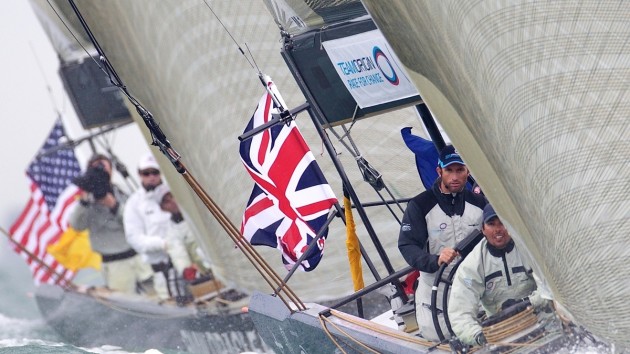Was there more to last week’s 1851 Trophy event than met the eye?
Last week’s America’s Cup style racing in the 1851 Trophy may have looked like a showcase event, but there was far more at stake in this ‘friendly regatta’.
With around 3-4 years to go until the next Cup, there are precious few long term contracts out there and this four day series was another opportunity for any crew member looking for a longer term deal to prove that they would be the right person for the job. But there were other reasons why the 1851 Trophy may turn out to be a significant event and play a part in shaping the future of the America’s Cup.
Shortly after the final prize giving, a warning shot passed over BMW Oracle Racing’s bow as Team Origin’s principal Sir Keith Mills told a Sunday newspaper that if the current America’s Cup holders don’t deliver a level playing field then, ‘we won’t compete.’
“There’s no point in spending millions of pounds on a challenge that’s unwinnable,” he told the Sunday Times.
His comments shortly after winning the 1851 Trophy and the Trafalgar Cup will surprise many, especially given the decisive manner in which his team proved that it could take on and beat the current Cup holders in a form of match racing that the American team has a long track record in.
There are however, some who may think that the American team were prepared to accept a loss at an event that counts for nothing towards the next America’s Cup. With plans for the new boat for the next event due to be announced at the end of September, winning the 1851 Trophy in a version 5 America’s Cup class boat that is unlikely to be used beyond this year, has little appeal for a team that is focussed on the next Cup cycle.
Yet there is a feeling within the British camp that last week BMW Oracle Racing were every bit as motivated as Team Origin to win the 1851 Trophy in order to ease the way forward for the next step in the new Cup cycle.
With the decision as to whether the next America’s Cup is to be raced for in monohulls or multihulls yet to take place, it is believed that the current Cup holders are strongly in favour of the latter. Hardly surprising perhaps, given that the American team is significantly further down the road with its experience of multihulls and wing masts in the last America’s Cup. If you’re going to level the playing field with talk of independent race officials and no racing between challenger and defender in the build up to the event, why give away the one significant advantage that you may have, technical know how.
To choose a multihull over a monohull would be a lot easier if your team had proved that it could win in either. But that wasn’t the case last week. While BMW Oracle Racing was the clear winner in the race around the island, when it came to the match racing, Ainslie and Co. had the upper hand.
So while a victory for the Brits in an event that drew plenty of attention will do Mills’ campaign and its search for funds no harm, the win could also help to put pressure on the American team over the next few weeks as it considers which way to step when it comes to the crucial decision on the boat.
According to Mills there is very little support from future challengers for a multihull.
“It was interesting that Oracle convened a meeting with fifteen or so designers back in May and there was a pretty strong consensus, around 90 plus percent, that a monohull would be the best solution,” he told YW. “They felt that a monohull produced a better, closer form of racing and I’d be surprised if they went down the multihull route. Our preference is a monohull.”
The next battle in the long campaign towards the 34th America’s Cup looks likely to take place ashore.




